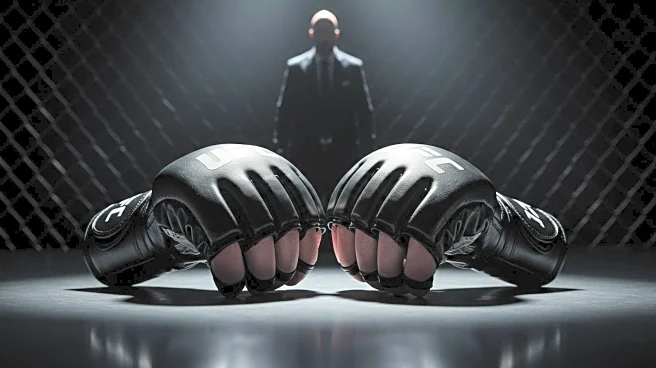What is the story about?
What's Happening?
Carlos Prates, a prominent UFC fighter, made headlines at UFC 319 after delivering a stunning spinning elbow knockout against Geoff Neal. Following his victory, Prates publicly addressed UFC President Dana White with a list of demands during his post-fight interview. Prates requested a fight at UFC Rio on October 11, coinciding with his birthday, and urged White to sign his friend Marcus Degli, an LFA flyweight champion with an 11-fight winning streak. Additionally, Prates asked for a $50,000 performance bonus, which White agreed to provide. The event also featured another spinning elbow knockout by Lerone Murphy, who became the top contender at featherweight.
Why It's Important?
The demands made by Carlos Prates highlight the growing influence and assertiveness of fighters within the UFC. By publicly addressing Dana White, Prates is leveraging his victory to secure opportunities for himself and his peers, potentially setting a precedent for other fighters to follow. This development could impact UFC's matchmaking strategies and fighter relations, as athletes increasingly use their platform to negotiate terms. The successful knockouts at UFC 319 also underscore the dynamic nature of the sport, with fighters like Prates and Murphy gaining significant attention and advancing their careers.
What's Next?
Dana White's response to Prates' demands suggests potential changes in upcoming UFC events, particularly UFC Rio. If Prates' requests are fulfilled, it could lead to increased visibility for Brazilian fighters and influence future event planning. The UFC may also face pressure to accommodate similar demands from other fighters, affecting contractual negotiations and event scheduling. Additionally, Lerone Murphy's rise as a featherweight contender could lead to a high-profile matchup with champion Alexander Volkanovski, further shaping the division's competitive landscape.
Beyond the Headlines
Prates' public demands raise questions about the balance of power between UFC management and fighters. As athletes become more vocal about their needs, the UFC may need to adapt its approach to fighter engagement and contract negotiations. This shift could influence the sport's culture, encouraging fighters to advocate for themselves and their peers. The emphasis on performance bonuses and event participation also highlights the financial aspects of the sport, with fighters seeking to maximize their earnings and exposure.

















